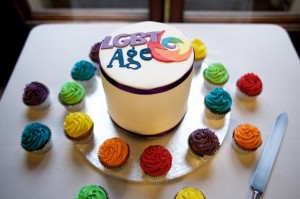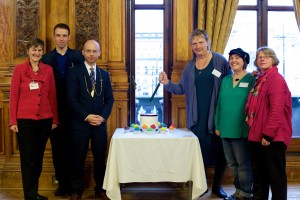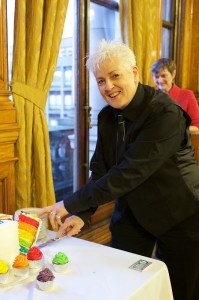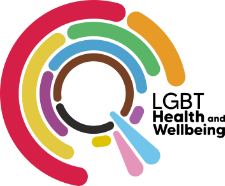
A groundbreaking project working with lesbian, gay, bisexual and transgender (LGBT) people over 50 has expanded to provide services in Glasgow alongside Edinburgh and the Lothians, following a grant award from the Big Lottery fund.
LGBT Health and Wellbeing launched its LGBT Age (Scotland) project in Glasgow at theCity Chambers on October 27th. Over 40 people came to support and celebrate the launch of the project, including representatives from government, the third sector, and local community groups. The launch featured performances by Jo Clifford and Sally Fox of work which featured in Lifelines, the intergenerational creativity project which ran through September and October.
The LGBT Age (Scotland) project provides a one-to-one volunteer-based befriending service, monthly social events and information sessions. The project has run successfully in Edinburgh since June 2010, helping reduce social isolation and increase resilience.
LGBT Health and Wellbeing Director, Maruska Greenwood said:
“Older LGBT people really have been overlooked. They have lived a great part of their life in much less liberal times, and are frequently reluctant to use support services as they fear not feeling welcome or accepted.

LGBT Age makes a real difference to individuals who may be isolated or disadvantaged by providing them with one-to-one support, information and safe and a welcoming social space where they can be themselves without fear of prejudice or discrimination. The project supports individuals to maintain their independence, and build the natural supports in their lives.”
Big Lottery Fund Scotland Chair, Maureen McGinn, added:
“At the Big Lottery Fund we want our funding to reach everyone who needs it – equally and without barriers. The LGBT Age (Scotland) project will carry out groundbreaking work to support an often overlooked minority. We are proud to fund this project and are delighted that many more people will benefit as it develops and expands from Edinburgh and the Lothians into Greater Glasgow.”

Scottish singer song-writer, Horse McDonald who attended the event said:
“Getting older creeps up on all of us. Sadly, sometimes we need help before we realise that we do. This is an essential service that other parts of the community take for granted. I would like to think that if I needed help, someone would be there for me. I am happy to support this project that will benefit many people.”
The voices of LGBT people who benefit from the services were captured in an audio montage. Their comments included:
“There’s a need everywhere, within any community, to have services for older LGBT people, because these people do – when they get older – feel a bit out of things. You go into a pub, it’s all young people. You need that mix with other older people, because that’s a great thing. We’re passing our knowledge to each other and we help each other.”
“It’s just so pleasant, comfortable and enjoyable to be sharing with other people, knowing that we’re on the same wavelength, that I’m not being misunderstood, that I’m not having to constantly monitor what I’m saying. I’m really glad I came along.”
One of the service’s clients explains,
“I benefit from having a befriender as it has allowed me to get out and about and has introduced me to new situations that I would otherwise not have experienced.”
Older LGBT people have a lot of issues in common with other older people – and they are also dealing with a wide range of issues relating specifically to their LGBT identity.
Research shows however that older LGBT people are less likely to access services than other older people and more likely to be isolated and without family to call on. Some older LGBT people may be facing challenges such as coming to terms with their sexual orientation or gender identity later in life, ageing with HIV or coping with the loss of a same sex partner.
The LGBT Age (Scotland) project was developed following extensive consultation with older LGBT people. Many concerns were
raised through the consultation including the following comments:
“I have to be careful with my gay issues because it can get very difficult to be ostracised in sheltered housing.”
“People are less fearful of associating with gay people – but even today I find myself thinking people may misinterpret me if I touch their arm or something – hopefully it’s different for the new generation.”
“I go to a GP’s surgery and look at the posters and think ‘where are we?’ It makes me reluctant to come out – he (the GP) doesn’t know I’m gay – he might be OK, but what if he wasn’t?”

